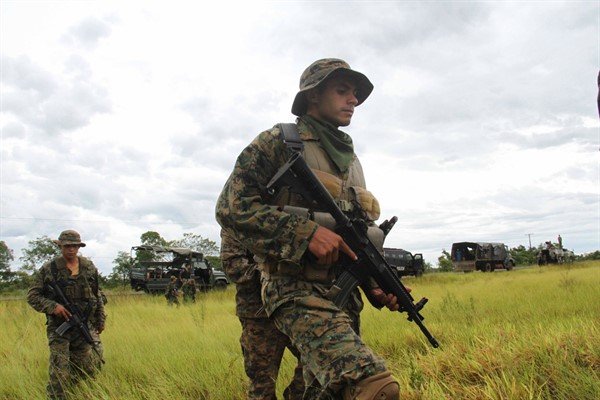On Sept. 2, Paraguay’s conservative president, Mario Abdo Benitez, cleared his schedule to fly north to a forest on the edge of a ranch in the province of Concepcion. There, around 220 miles from the capital, Asuncion, he posed for photographs—a handgun visible at his side—in a camp belonging to the Paraguayan People’s Army, or EPP, an armed group with barely 50 members. A combined military-police task force, known as the FTC, had just concluded a “successful operation,” Abdo Benitez posted on Twitter. Soldiers had shot dead two EPP fighters, he announced, and were closing in on the others, who had left behind weapons, $16,000 in cash, books on Lenin and Marx, and a DVD about Pablo Escobar.
That official account of the raid on the rebel camp, though, soon fell apart. A local forensics official suggested the two slain individuals were both female, aged between 15 and 18. But the girls’ family members in Argentina, where their details were sent for verification, suggested they were far younger. Two days after the raid, Argentina’s Foreign Ministry issued an angry statement indicating that the bodies actually belonged to two 11-year-old girls, both Argentine citizens. Family members revealed that the girls—Maria del Carmen Villalba and Lilian Mariana Villalba—had been raised in Argentina and were visiting their fathers, both reportedly EPP members. Carmen Villalba, an EPP member jailed in Paraguay since 2003 for her role in several attacks, has indicated that the two girls were her nieces. The girls’ bodies were exhumed and their identities and ages confirmed. The United Nations urged Paraguay to carry out an urgent, impartial investigation.
While Abdo Benitez later expressed his regret over the deaths, he insisted that the EPP was also guilty for using minors as human shields. But he has continued to face fierce domestic criticism over the killings—not least for violating Paraguay’s binding international and constitutional commitments to protect children, including alleged child soldiers. Gunpowder traces on one of the girls, her family’s lawyers argued, did not necessarily prove that she had fired a handgun, as the government claimed. And family members said that one of the girls’ bodies bore the signs of torture at the hands of Paraguayan security forces—allegations the government strenuously denies. The hasty burial of the girls and the burning of their clothes, which could have helped clarify the circumstances of their killing, was justified by the authorities as necessary under COVID-19 prevention protocols. But official guidance from the Ministry of Health refutes that claim.

